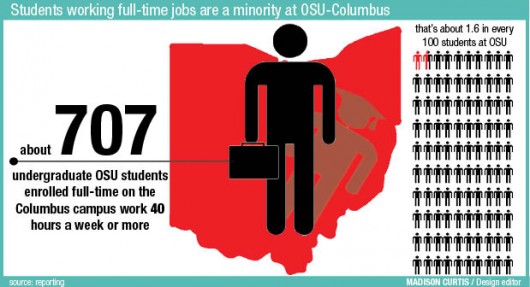Wake up. Go to class. Work. Do homework. Sleep. Repeat.
Some students who work full-time and are enrolled as full-time students at Ohio State leave themselves little room for anything but their responsibilities.
Jeff Adams, a third-year in business who works part-time and goes to school full-time, said prior to coming to OSU, he attempted to work 30 hours a week and attend school full-time at Cuyahoga Community College in Cleveland, but ended up dropping out of school.
“Some people are gifted and have the extraordinary ability to manage their time and absorb information from their classes,” Adams said. “Out of all the people I have met, there are not that many of them who can, and I certainly can’t do it.”
But there are some who balance the workload: of the more than 44,200 undergraduate students enrolled at OSU’s Columbus campus, 1.6 percent work 40 hours a week or more, according to data from the 2012 National College Health Assessment provided in an email from OSU spokesman Gary Lewis.
Adams said there are significant differences between being a full-time employee and a full-time student.
“There is a lot of time management and personal responsibility involved when you’re a full-time student. When you work full-time, your typical schedule is that you wake up at 5 a.m. … you work until 3 p.m. and the day is done,” he said. “At school, you constantly (have) something going on. There might be something that’s due tomorrow, something that’s due tonight or something that’s due within a week from now. On top of that, your schedule changes every semester, so you have to adjust to that, too.”
Fletcher Fiely, a fourth-year in English, said he balances an internship, two part-time jobs and a full-time school schedule at OSU.
“At my restaurant job, I work around 25 hours a week, at my other job at a laundromat, I also work around 25 hours a week, and at my internship, I work 15 hours a week, and I take 12 credit hours,” Fiely said.
With his day starting at 8 a.m., Fiely said he usually doesn’t get home until about 10:30 p.m. or 11 p.m.
“I always tell people I’d have a better GPA if I had time,” Fiely said. “I’m not doing bad in school, but there’s no doubt in my mind I could have a 4.0 if it weren’t for all of the work that I do.”
Student Life spokesman Dave Isaacs said Student Life’s Counseling and Consultation Service can help busy students sort through the stresses of their responsibilities.
“Balance is the key for anyone who is juggling a great deal in their life,” Isaacs said.
Lauren France, a second-year in health sciences, said she takes 18 credit hours but does not work during the school year because she feels her grades would suffer.
“I feel like grades are more important and I don’t think I could manage doing both,” France said.
Fiely said, though, for him it isn’t a choice of which is more important.
“I have to survive. I have rent, I live in a house and I have bills to pay,” Fiely said. “(But) I don’t do it out of necessity … I kind of do it to keep myself motivated more than out of necessity. (You’ve) got to keep yourself busy, keep working so you don’t get lazy. It’s so easy to fall into that trap of laziness.”
Fiely said he works in a social life when he can and added that breaks are a must.
“By the end of every semester, I’m going insane,” Fiely said. “It takes a toll on you physically, mentally — you just get tired and you have to take a day off.”
Fiely said the routine of working all the time for two or three years can leave him feeling guilty and anxious if he takes time off, and said it’s easy to become envious and resentful of people who don’t work as much.
“It makes me mad sometimes when people try to act like they’re so busy with school,” Fiely said. “Do you know how many things I have to half-ass that I didn’t really want to half-ass?”
Fiely said he wants to continue to work hard after he graduates, though.
“I hope I always work hard but I hope I get to do it by choice and not by obligation,” Fiely said.



